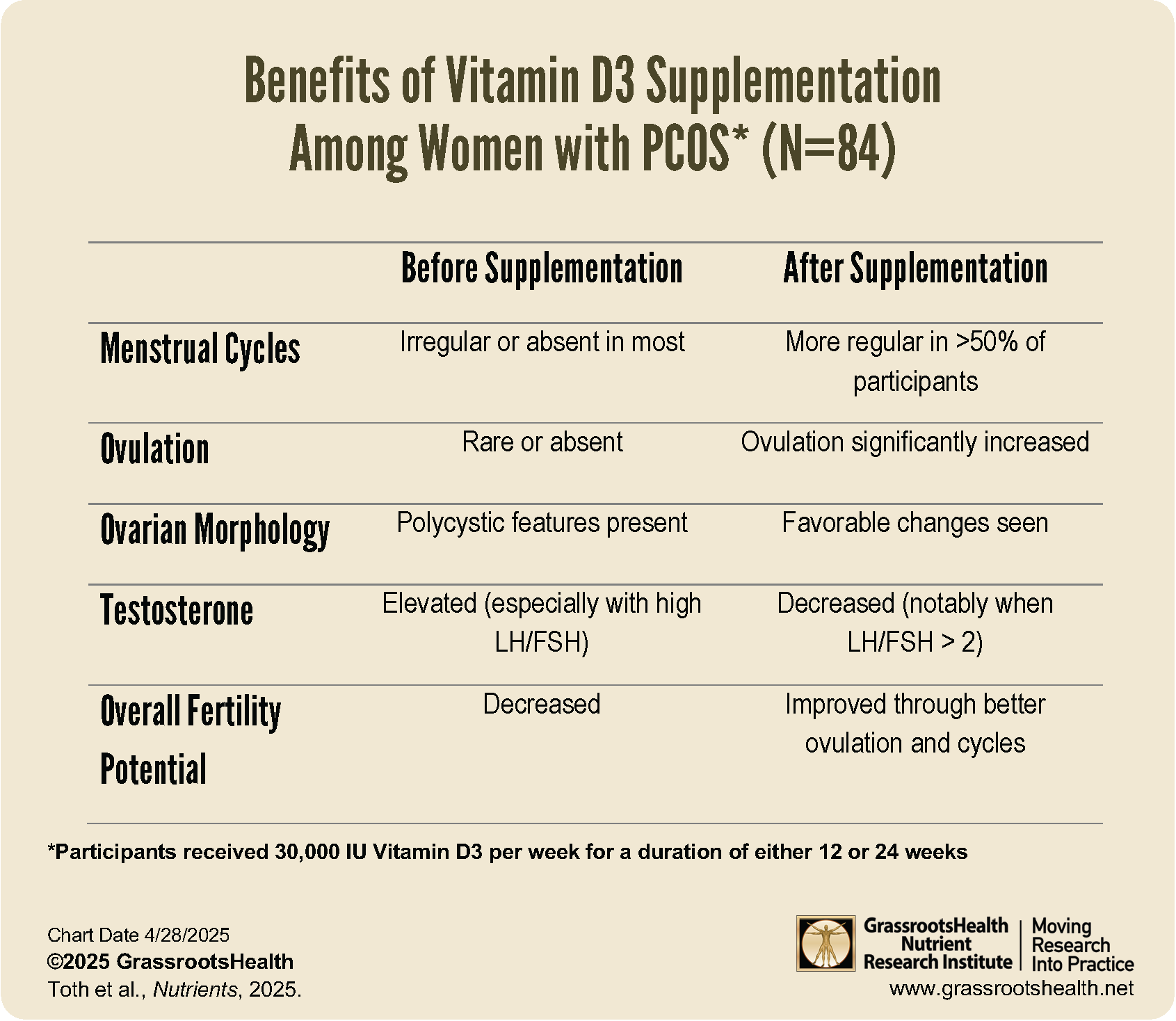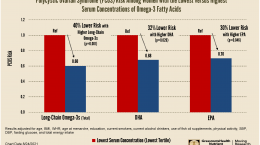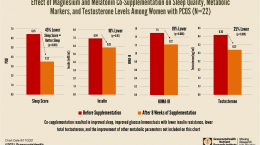Published on April 29, 2025
RCT among women with PCOS demonstrates vitamin D repletion improved ovarian morphology, improved cycle regularity, and increased the number of ovulations
Key Points
- Evidence suggests that improving vitamin D levels could help regulate menstrual cycles and boost ovulation, leading to better fertility. In fact, a previous study by Pal et al. found that higher vitamin D levels independently predicted better reproductive success in women with PCOS.
- A new study demonstrates that vitamin D supplementation among women with PCOS can lead to improvements in cycle regularity, favorable changes in ovarian structure, increased ovulation rates, and a significant reduction in testosterone levels among those with a high LH/FSH ratio
- These studies show that increasing vitamin D levels can be a simple, evidence-supported strategy to improve fertility outcomes for women with PCOS — promoting healthier cycles, better ovulation, stronger embryo development, and higher pregnancy success.
 A newly published double-blind two-phase randomized controlled clinical trial by Toth et al. clearly demonstrates the effects of vitamin D supplementation on reproductive health among women with PCOS (Polycystic Ovary Syndrome). The greatest benefits were seen among women with vitamin D deficiency at baseline who achieved vitamin D sufficiency after supplementation; additional benefits were observed with continued supplementation over time.
A newly published double-blind two-phase randomized controlled clinical trial by Toth et al. clearly demonstrates the effects of vitamin D supplementation on reproductive health among women with PCOS (Polycystic Ovary Syndrome). The greatest benefits were seen among women with vitamin D deficiency at baseline who achieved vitamin D sufficiency after supplementation; additional benefits were observed with continued supplementation over time.
Relationship Between Vitamin D, PCOS, and Fertility
PCOS affects 5–10% of women worldwide and contributes to infertility in about 83% of those affected. Vitamin D deficiency is very common in PCOS, with 67–85% of women with PCOS being vitamin D deficient. This is important because of the critical roles vitamin D plays in
- Menstrual cycle regulation
- Follicular maturation (growth of healthy eggs)
- Endometrial receptivity (preparing the uterus for implantation)
- Steroid hormone production (progesterone, estradiol)
- And much more…
Vitamin D deficiency is linked to
- Ovulatory dysfunction (trouble releasing eggs)
- Hormonal imbalances (high testosterone, altered LH/FSH ratio)
- Metabolic problems (like insulin resistance)
Vitamin D has a direct influence on the activity of several reproductive organs, including the ovaries, uterus, placenta, pituitary gland, and hypothalamus. Evidence suggests that improving vitamin D levels could help regulate menstrual cycles and boost ovulation, leading to better fertility. In fact, a previous study by Pal et al. found that higher vitamin D levels independently predicted better reproductive success in women with PCOS. Specifically
- Live births were 44% lower among women with vitamin D levels below 30 ng/ml (75 nmol/L)
- Live births were 4x higher among women whose levels were 45 ng/ml (112.5 nmol/L) or higher
- Every 1 ng/ml increase in vitamin D was associated with a 2% increase in live birth rates
New RCT Study Design and Findings
The clinical trial by Toth et al. enrolled 84 women with PCOS, aged 18 years and older, with vitamin D levels between 10–30 ng/mL and a BMI of less than 36. The women were split into two groups:
- Group D12: Received a placebo for 12 weeks (to ensure a vitamin D deficient state for comparison) followed by Vitamin D (30,000 IU/week) for 12 weeks
- Group D24: Vitamin D (30,000 IU/week) continuously for 24 weeks
Calcium supplements were given to participants whose average dietary calcium intake was below 1000 mg/day. All women were followed for the 24-week period, with measurements taken for
- Ovarian morphology via transvaginal ultrasonography (TVUS)
- Menstrual cycle length and ovulation rates
- Hormone levels (testosterone, progesterone, etc.)
The study found that, after supplementing with vitamin D,
- Over half the participants showed improvements in cycle regularity
- Favorable changes were observed in ovarian structure
- Vitamin D3 significantly increased ovulation rates
- In patients with a high LH/FSH ratio (>2), there was a significant reduction in testosterone levels
More specifically, for the D12 group, two-thirds of the women reported more frequent menses and reduced cycle length after 12 weeks of vitamin D supplementation. Among women in the D24 group, over 75% experienced improved regularity and reduced cycle length after 24 weeks of supplementation; this response to supplementation was greatest during the second 12 weeks of supplementation, suggesting greater improvements with continued supplementation over time. Of note, women in the D24 group achieved an average vitamin D level above 45 ng/ml.
In Conclusion
Vitamin D3 supplementation can improve menstrual cycle regularity, ovulation rates, and ovarian structure, helping boost fertility in women with PCOS, especially in those with hormone imbalances. These studies show that increasing vitamin D levels can be a simple, evidence-supported strategy to improve fertility outcomes for women with PCOS — promoting healthier cycles, better ovulation, stronger embryo development, and higher pregnancy success.
How Are Your Levels of Vitamin D and Other Important Nutrients?
Do you know what your vitamin D level is? Check yours along with omega-3s, magnesium, and other levels today as part of the vitamin D*action project; add the Ratios for more about how to balance your Omega-3s and 6s!
Measure your:
- Vitamin D
- Magnesium PLUS Elements
- Omega-3 Fatty Acids
- hsCRP (for Inflammation)
- HbA1c (for Blood Sugar)
- and more
Did you know that each of the above can be measured at home using a simple blood spot test? As part of our ongoing research project, you can order your home blood spot test kit to get your levels, followed by education and steps to take to help you reach your optimal target levels. Start by enrolling and ordering your kit to measure each of the above important markers, and make sure you are getting enough of each to support better mood and wellbeing!
Build your custom kit here – be sure to include your Omega-3 Index along with your vitamin D.
Start Here to Measure Your Levels







